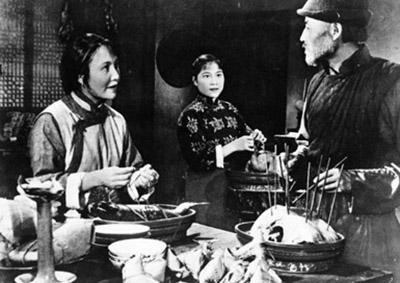Directed by Sang Hu
One of more confounding aspects of Chinese cinema of the "Seventeen Years" period is the prevalence of films derived from works associated with the left-leaning, Western-influenced May 4th Movement, which Mao Zedong had implicitly denounced as being insufficiently attentive to the lives of the peasantry and the mechanics of class struggle. However, the literary cachet of these works assured audiences that the film adaptations would be "quality pictures," while their mildly progressive politics made them reasonably acceptable to the ideological dictates of the new regime. Hugely successful at the time, these films have a fascinating awkwardness about them, the square peg of early modernist literature meeting the round hole of socialist realism. Based on the celebrated short story by literary lion Lu Xun, New Year's Sacrifice---which chronicles the travails of a poor servant (Bai Yang) in the house of a wealthy noble family who is twice sold into marriage, twice widowed and forced back into lowly servitude---is among the most successful of these adaptations, largely due to a refined screenplay by May 4th acolyte Xia Yan and the carefully detailed direction of Second Generation master Sang Hu.
Beijing Film Studio. Producer: Dai Hao. Screenwriter: Xia Yan, based on the story by Lu Xun. Cinematographer: Qian Jiang. Editor: Yang Xueming. Cast: Bai Yang, Li Jingbo, Wei Heling, Guan Zhongqiang, Shi Lin.
35mm, b/w, in Mandarin with English subtitles, 110 min.






 Mobile Navigation
Mobile Navigation

